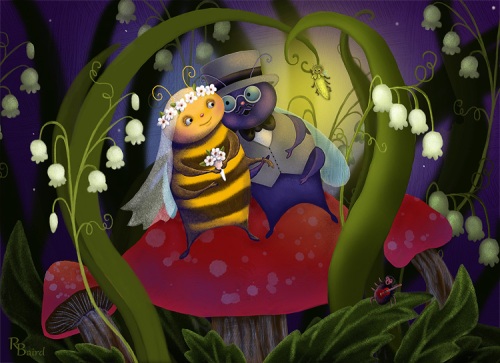
May Illustration by Roberta Baird. Roberta was featured on January 7th this year. http://kathytemean.wordpress.com/2012/01/07/illustrator-saturday-roberta-baird/

How you approach a critique session is as important as the actual critique. When authors are new to the field, focused solely on getting published, or bringing their “best manuscript ever” to a critique session, they often apply The Romantic Approach. It looks like this:
You slide into your seat for your long-anticipated critique. The editor or agent says, “I’m so glad you came to this conference. Your manuscript is brilliant. I have to work with you.” You rush to your pens, sign dotted lines, and with mere tweaking (if any) have a wonderfully reviewed, bestselling book in the hands of children, families, teachers, librarians, booksellers, and bloggers everywhere.
Within the same calendar year, of course.
Though The Romantic Approach sounds romantic, (Romantic, defined as “unrealistic” www.dictionary.com) it is fulfilling only before the critique session itself—oh, the jittery-ness, the anticipation.
(What? You think I would write this if I didn’t “test out” these ideas first?)
But once the session ends, it could lead to negative thoughts like, “Should I even be writing?” or “Does this senior editor at the best publishing house in the world really know what he/she is talking about?”
It might take time (And reminders from your loving writing group) to let go of The Romantic Approach to the critique session.
However, authors who have been married (to writing), acknowledge that romance is not as “fruitful” as passion. Passion is the reason writers write. (That, AND the really big paychecks.)
For your upcoming critique session, consider The Passion Approach. It looks like this:
You sit down, having selected your critiquer because you admire his/her work. (And OWN some of it.)
The editor or agent says, “I’ve got feedback for you.” There are no dotted lines, but still, you rush to your pen to take notes on your Passion Approach Critique Sheet (PACS). You listen to what is said and let the feedback wash over you. You listen to what is not said. You ask questions, get insights, and try to learn more.
At the end of the session, you have genuine feedback, a PACS that can be referenced (and later grouped with other PACS to identify common feedback), and a sense of the editor/agent’s interest, tastes, and professionalism.
In the best cases, you also get a “diamond,” (If you’re thinking carats, you’re back to The Romantic Approach) a nugget of learning that permanently impacts your writing.
By adopting The Passion Approach, you separate the sale of the manuscript from the critique of the manuscript. This does not mean that you do not care if your work is sold and published. It means that you care about your work and your audience enough to want it published with the right revisions, at the right time, with the right editor/house, and with the right agent/agency representation. In this case, even your grandma (You know, the one that wrote the letter to Oprah about you and your books) would approve of passion over romance.
Talk Tomorrow,
Kathy
Filed under: Advice, Display Comments Add a Comment



So, in your next blog are you going to give us that PACS sheet?? Great reminder to look for diamonds!
Thanks for the well-timed post, Kathy! I have a critique with an agent tomorrow. I’m going in passionate (not romantic)!
One more warning, from my own personal experience: even if a critique session actually does meet your romantic fantasies, beware! In writing, as in dating, there is such a thing as “too good to be true.”
Reblogged this on Prose Ventures and commented:
We’re so pleased this one came to us. This is a fantastic “inspirational” for any writer- especially for those with a solid vision or plan, as opposed to simply getting any ole’ thing published.